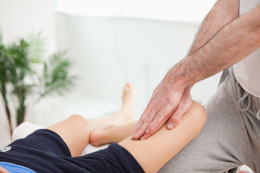One may experience a pain in the thigh when sitting due to various reasons from a normal muscle pull to something serious associated with the bones. This article provides some information on the same.

Sometimes, one may experience thigh pain when sitting or while getting up after sitting for a long time. Thigh pain when sitting is more often caused by muscle pull or muscle sprain. It affects our legs causing much discomfort while walking. The pain is sometimes sharp and excruciating causing a difficulty in movement. The causes diagnosed clinically are elaborated below.
Causes
There are several reasons behind this medical condition. The pain might be felt in the upper thigh or in the back of the thigh. The symptoms are nearly the same.
Quadriceps Muscle Pull
The muscles in the frontal region of the thigh, when pulled cause thigh pain and numbness. The pull hampers stretching causing momentary numbness of the legs and the thigh. The upper thigh muscles usually get pulled under such conditions.
Hamstring Muscle Pull
The hamstring muscle, running from the buttocks to the back of knee joint gets pulled and causes pain in the inner thigh. The pain extends from the hips towards the thighs causing sitting and standing very difficult. One might feel the presence of a lump if he/she touches the back of the thigh.
Groin Muscle Pull
Thigh muscles sometimes get taut causing a twitch. A groin muscle pull causes a sharp pain in the thigh while sitting down. This mostly happens while performing sportive activities. The abductor muscle gets stretched giving rise to chronic pain in the thigh.
Meralgia Paresthetica
A nerve injury between the spinal column and the thigh causes a burning sensation inside the thigh. It also causes terrible leg pain when sitting due to compression of the nerve endings. There might be breakage of nerve endings under such circumstances.
Osteoarthritis
Pain in upper thigh is one of the symptoms of osteoarthritis. In this case, the cartilage of the thigh joints degenerate. Deteriorated cartilage of hip joint also causes pain on thigh. Sitting and moving the legs become very painful for the people affected by arthritis.
Lipoma
During lipoma, uncontrolled growth of tissues of the skin takes place. If it affects the thigh muscles, a tumorous growth is formed around that region. It also affects other regions like the torso, armpit, and the arms. Initially there is no pain but as the tumor increases the pain becomes severe.
Muscle Spasms
Muscle spasms is one of the most common causes of this medical condition. Pain in the upper thigh is caused when the nerve gets twitched. This is mostly observed during sudden jerky movement of the leg and the thigh. Muscle spasms cause immense pain while sitting and walking.
Sciatica
Hernia in the spinal disc gives rise to a condition known as sciatica. The pain is first felt in the spinal cord, gradually seeping to the hips and the thighs. A sharp pain in thigh is felt while trying to sit or bend as the nerve gets exposed to pressure.
Osteomyelitis
A person affected by osteomyelitis experiences immense thigh pain while sitting. The thigh bones get inflamed with bacteria, that causes a sharp pain inside the bones. Walking also becomes considerably difficult. The infected area becomes sore and red. Accumulation of pus also takes place around the thighs.
This pain is usually treated with painkillers, injections, or pain-relief ointments. A muscle pull or twitch needs regular thigh exercises to get back the normal flexibility. Sometimes, deficiency in calcium causes frequent spasms. Doctors advise calcium doses for a certain period of time to supplement the calcium needs of the body. However, treatment varies according to the underlying reasons. An X-ray is usually done to detect the presence of any disorder in the thigh. People affected by arthritis, usually take a long time to recover. A surgery is required to get rid of the tumorous growth.
Disclaimer:
This Buzzle article is for informative purposes only, and should not be used as a replacement for expert medical advice.


 Sometimes, one may experience thigh pain when sitting or while getting up after sitting for a long time. Thigh pain when sitting is more often caused by muscle pull or muscle sprain. It affects our legs causing much discomfort while walking. The pain is sometimes sharp and excruciating causing a difficulty in movement. The causes diagnosed clinically are elaborated below.
Sometimes, one may experience thigh pain when sitting or while getting up after sitting for a long time. Thigh pain when sitting is more often caused by muscle pull or muscle sprain. It affects our legs causing much discomfort while walking. The pain is sometimes sharp and excruciating causing a difficulty in movement. The causes diagnosed clinically are elaborated below.